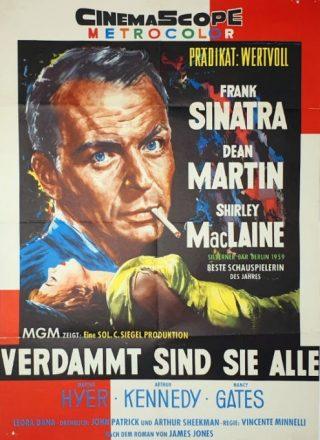
Some Came Running (1958) is quite simply a great movie. It's a study of fear and frustration in small town America in the post-war years. Every main character is scared or insecure in one way or another, scared and insecure within themselves, wary and mistrustful of their strengths and weaknesses, and frequently unaware of or unclear about the difference. Essentially, everybody we encounter wants what he or she cannot have, all except one. That one person appears to be the greatest dreamer of the lot, and yet it's the purity of that dream that means it stands more chance of being realized than all the other castles in the sky combined.
Homecomings ought to be happy affairs, a chance to strengthen bonds and reacquaint oneself with family and friends, but as Elmer Bernstein's frantic and vaguely discordant score plays over the credits, there's no suggestion of joy ahead. We're riding a bus, and the view through the windows is of countryside dipping and rolling down towards the town of Parkman, Indiana. There's a touch of symbolism in that shot, the physical descent mirrors the spiritual one the protagonist is on, the process of stepping down from his emotionally and intellectually detached position to confront and reconnect with his past (indeed with himself) before he earns the right to ascend once more. It's a practically deserted bus too and you get the impression that Parkman isn't the kind of town people are in a hurry to reach, quite the opposite in fact. Slumped by the window and sleeping off what must have been a heavy night is Dave Hirsh (Frank Sinatra), a demobbed soldier back in his home town for no better reason than the fact his friends told the driver to drop him there. The only other passenger is Ginny (Shirley MacLaine), a "hostess" from Chicago who has followed Dave. While others naturally impact on the development of the story, it is these two who form the dramatic axis at the heart of the tale. He's what might be described as a lapsed writer, a man who has lost his spark somewhere along the line and has traded his talent for a sour mix of whiskey and cynicism. And yet he hasn't completely resigned himself to idle contemplation of the shot glass, as evidenced by the fact he still carries around his last manuscript, one he appears to regard with fond dissatisfaction.
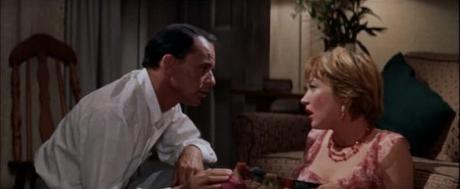
Dave Hirsh is the man through whose eyes we follow the majority of events, watching his struggle with his art, with his friends and relations, and of course with himself. While he acts as our point of reference, it's through his interaction with Ginny above all that we gain the broader perspective that adds depth. The growth and development of the character of Dave is propelled mainly by the presence and actions of Ginny, even if she is not always aware of the pivotal position she occupies.
"I don't understand you neither, but that don't mean I don't like you. I love you! But I don't understand you. Now what's the matter with that?"
When we first encounter him, he is quite literally in a dark place, deflated, directionless and drunk. By the end of the movie, while there's grief and sorrow on show, he's returned to the light by having rediscovered everything that matters - he has recaptured his spirit, and that is reflected both in his renewed awareness of his artistic worth and his recovered self-esteem as a human being who now understands he is capable and deserving of love.
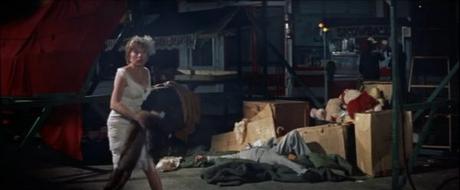
What then of Ginny? Well, if Dave's moment of truth, the bittersweet dawning of realization, comes late in proceedings, much of the impetus has derived from the presence of Ginny. Dave has spent an inordinate amount of time kidding himself that his salvation lies with the bookish and frigid Gwen (Martha Hyer). However, this is an illusion fed by his desire to escape the carefully constructed edifice of hypocrisy as represented by his brother Frank (Arthur Kennedy) and the grand soulless house he inhabits with his disaffected wife (Leora Dana) on the one hand, and the creative wasteland he's found himself wandering through for years on the other. Gwen is incapable of loving anyone or anything real, at least in a physical sense. She resides in a house steeped in learning, a place where culture is a staple to the point that books proliferate and are to be found even in the kitchen, offering sustenance to the mind. Yet Gwen worships a kind of chaste and empty conception of art, one where the artist is a detached and essentially impotent figure, rendering art itself barren in the process. Juxtaposed with the emotional vacuum presented by Gwen is the simple, inarticulate tenderness of Ginny, the type of honesty that defines humility, and therefore selfless love. There's a pathetically beautiful scene played out in an empty classroom just before the movie's climax, that lays bare the contrasting characters of the two women - Gwen buttoned into her suffocating propriety, with just a hint of spite peeking out, while Ginny is a gushing mess of devotion and rouge. It is hard to imagine anyone essaying the vulnerability, warmth and utter lack of pretension or guile more successfully than Shirley MacLaine.
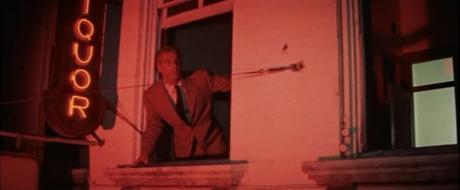
This shopworn ingenue who displays more nobility and emotional candor than anyone else is portrayed as a semi-comic figure throughout, with her ever present fur piece struggling to achieve some uneasy sophistication alongside the hopelessly immature handbag. Then right at the end, the mask is reversed to become the embodiment of tragedy. It seems fitting that this plays out as a Technicolor (Metrocolor, for the sake of accuracy) symphony, showcasing the intense and hypnotic use of color by Minnelli. In fact this sequence is shot, as indeed are a number of key passages, like a cinematic ballet; figures drift from light into darkness according to the ebb and flow of emotion, alternately cloaked in shadow and bathed in rich, vibrant hues, dancing around the flame of Minnelli's camera.
If aspects of the movie are visually (by the way, cinematographer William H Daniels' contribution should not be underestimated) and rhythmically reminiscent of a musical, this is perhaps to be expected given the involvement of Minnelli, Sinatra and Dean Martin. Sinatra was at the height of his powers at this stage; he had a series of strong performances in some fine movies behind him - his screen work beginning with another James Jones adaptation From Here to Eternity and continuing up to the underrated A Hole in the Head for Capra constitutes a remarkable run - and his recordings for Capitol during these years are just sublime.
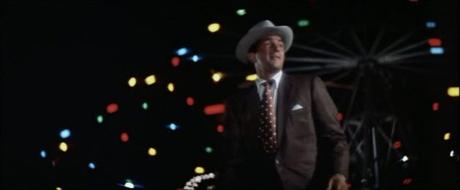
There is a lifetime of full-blooded living coloring Sinatra's performance as Dave Hirsh and it feels as though this inspired those around him to travel that extra mile too. Dean Martin could be a lazy actor, falling back on that easygoing charm and his drawling drunkard shtick all too readily. Sure there is some of that in his Bama Dillert, but he brings a shading to the role that elevates it. He's every bit as much a victim of the insecurity which runs rampant among the characters as anyone else - after all, isn't the gambler, with his affectedly casual love affair with lady luck, the very epitome of uncertainty? What stands out most of course are the stubbornness and loyalty (two traits which aren't all that far removed when you think about it) which define him. His pig-headed refusal to consider any change to his behavior, even when faced with the loss of a friendship and the threat to his health and life, feels credible in his hands. And the hat business is treated almost as a running gag, right up to the last shot of the movie, where it suddenly transforms into something deeply touching.
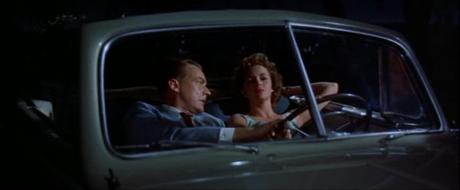
Like MacLaine and Hyer, Arthur Kennedy was nominated for an Oscar for his work on the movie - none of them won but it has to be said there was pretty stiff competition that year. Recently, I looked at , a relatively obscure British thriller, from a few years earlier and which saw Kennedy falling prey to middle-aged dissatisfaction. The part of Frank Hirsh offered the opportunity for further exploration of that theme. It's a strong piece of work in truth, the calculating suspicion he feels at the beginning is slathered over inexpertly with fake bonhomie and unctuousness, none of which stands much chance of deceiving anyone for long. That dust dry laugh and back-slapping hospitality is just as much of a front as the image of familial harmony he works so hard to project. Yet, when it all comes crashing down in the aftermath of an ill-advised evening with Nancy Gates, there's a sense of wistfulness about the whole affair. It is to Minnelli's and the film's credit that neither Gates nor Kennedy are explicitly judged or condemned; that mature generosity of spirit is admirable.
Warner Brothers released Some Came Running years ago in a box set of Sinatra movies. The CinemaScope image looks fine, and there's a 20 minute feature on the movie as a supplement. Still, I have to wonder why a film of this quality hasn't yet made it to Blu-ray since Minnelli's mise-en-scène and use of color and shadow would surely look spectacular in high definition. Hopefully, this omission will be addressed sooner or later. The movie itself remains a great favorite of mine, and has been ever since I first viewed it many years ago. So, let me just end as I began by stating that this is simply a great piece of cinema, and I recommend it without reservation.
